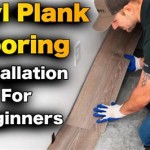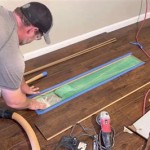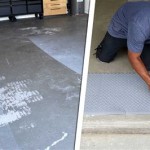A Comprehensive Guide to Securing Vinyl Flooring with Glue
Vinyl flooring has become an increasingly popular choice for homeowners and businesses alike due to its durability, affordability, and low maintenance requirements. To ensure the longevity of your vinyl flooring, it is crucial to secure it properly with glue. While the process may seem daunting at first, it can be easily accomplished with the right tools and techniques. This guide will provide you with a step-by-step overview of the essential aspects of securing vinyl flooring with glue.
Choosing the Right Glue
The first step towards securing vinyl flooring is selecting the appropriate glue. There are several types of glue available, each formulated for specific types of vinyl flooring and subfloors. It is essential to consult with a flooring professional to determine the most suitable glue for your project. Factors to consider when choosing glue include the subfloor type, vinyl composition, and traffic conditions the flooring will be subjected to.
Proper Subfloor Preparation
Before applying glue, ensure the subfloor is clean, level, and dry. Remove all dirt, debris, or other contaminants that may affect the adhesion of the glue. If the subfloor is not level, you may need to use self-leveling compound to create a smooth and even surface. Ensure the subfloor is completely dry to prevent moisture from compromising the bond between the vinyl flooring and the glue.
Applying the Glue
Once the subfloor is prepared, you can begin applying the glue. Using a notched trowel, spread the glue evenly over the subfloor in straight lines. The trowel notch size will vary depending on the type of glue and subfloor. Refer to the glue manufacturer's instructions for specific guidelines. Avoid applying too much glue as this can lead to buckling and other issues. Allow the glue to cure for the recommended amount of time before installing the vinyl flooring.
Installing the Vinyl Flooring
Position the vinyl flooring over the glued subfloor and press it firmly into place. Use a roller to remove any air bubbles and ensure proper adhesion. Work in small sections to prevent the glue from drying prematurely. If any excess glue squeezes out from the sides, wipe it away with a damp cloth.
Rolling and Securing
Once the vinyl flooring is installed, roll the entire floor using a heavy roller. This will help to create a strong bond between the flooring and the glue. Allow the flooring to set for the recommended amount of time, usually 24 to 48 hours, before walking on it or placing furniture.
Additional Tips
- Wear appropriate personal protective equipment (PPE), including gloves and a mask, when working with vinyl flooring and glue.
- Ensure proper ventilation in the work area to avoid inhaling fumes.
- Allow for expansion gaps around the perimeter of the room to prevent buckling.
- Use the recommended amount of glue to avoid excess oozing.
- If you encounter any difficulties or have questions, do not hesitate to consult with a flooring professional.

Laying Vinyl Planks The Right Way Expert Guide By Fantastic Handyman

Installation Guide For Diffe Vinyl Floors Aolong Flooring

What Is Loose Lay Vinyl Flooring A Plank Guide Reallyfloors America S Est Hardwood

Glue Down Vinyl Flooring A Guide To The Benefits And Installation Instructions Floorings

A Guide On How To Lay And Install Glue Down Dryback Lvt Luxury Vinyl Tile Floor Such As Amtico

The Pro Guide To Glue Down Vinyl Flooring Craving Some Creativity

A Beginner S Guide To Installing Vinyl Plank Flooring Dumpsters Com

How To Install Plank Vinyl Glue Down

Installing Vinyl Plank Flooring Step By Guide Homeserve Usa
How To Lay Vinyl Flooring Sheets Tiles And Planks Tarkett
See Also







